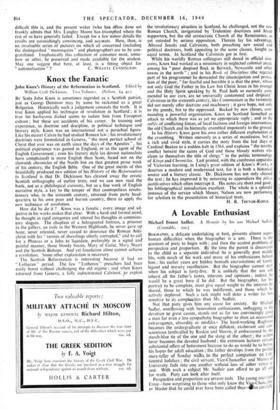Knox the Fanatic
John Knox's History of the Reformation in Scotland. Edited by William Croft Dickinson. Two Volumes. (Nelson. .C.s.
BY Scots John Knox is sometimes regarded as a Scottish patriot,
Bst as Georgi Dimitrov may by some be reckoned as a great ulgarian. Historically such a judgement conceals the truth. It is true Knox applied his technique of revolution in Scotland ; it is true his barbarous dialect seems to isolate him from European culture ; but these are accidents of his career. In training and experience, in doctrine and discipline, in political technique and literary style, Knox was an international not a parochial figure. Like his master Calvin he had studied Roman law ; his revolutionary doctrines were formulated in Geneva, " the most perfect school of Christ that ever was on earth since the days of the Apostles " , his political experience was gained in England, or as the agent of the English Government ; even his literary style (as devout nationalists have complained) is more English than Scots, based not on the clownish chronicles of the North but on that greatest prose work of his century, the English Bible. One of the great merits of this beautifully produced new edition of his History of the Reformation in Scotland is that Dr. Dickinson has cleaned away the erratic Scottish orthography of earlier texts, and we can now read the book, not as a philological curiosity, but as a fine work of English narrative style, a key to the temper of that cosmopolitan revolu- tionary who. in the sixteenth century, returned from party head- quarters to his own poor and barren country, there to apply the new technique of revolution. -
How did he do•it ? Knox was a fanatic ; every image and ad- jective in his works makes that clear. With a hard and formal mind, he thought in rigid categories and uttered his thoughts in commina- tory slogans. The chaplain of a beleaguered fortress, a prisoner in the galleys, an exile in the Western Highlands, he never gave up hope, never relented, never ceased to denounce the Roman Anti- christ with his " vermin of shavelings utterly corrupted," and to call for a Phineas or a Jehu to liquidate, preferably in a signal and painful manner, those bloody beasts, Mary of Guise, Mary Stuart and the Scottish Bishops. And yet fanaticism alone cannot achieve a revolution. Some other explanation is necessary.
The Scottish Reformation • is interesting because it had no " Lutheran " period. The few " Lutheran " preachers had been easily burnt without challenging the old regime ; and when Knox returned from Geneva, a fully indoctrinated Calvinist, to exploit the revolutionary situation in Scotland, he challenged, not the new Roman Church, invigorated by Tridentine doctrines and Jesuit supporters, but the old aristocratic Church of the Renaissance, as yet untested by serious opposition. Therein lay his advantage. Abroad Jesuits and Calvinists, both preaching new social and political doctrines, both appealing to the same classes, fought on equal terms. In Scotland the Calvinists got in first.
While his worldly Roman colleagues still dozed in official sine- cures, Knox had worked as a missionary in neglected colonial areas. among his " poor despised flock in Berwick, Newcastle and other towns in the north " ; and in his Book of Discipline (the rejected part of his programme) he demanded the emancipation and protee. tion of the poor, " for fearful and horrible it is that the poor, whom not only God the Father in his Law but Christ Jesus in his evangel and the Holy Spirit speaking by St. Paul hath so earnestly com- mended to our care, are so universally contemned and despised.' Calvinism in the sixteenth century, like Communism in the twentieth did not merely offer doctrine and machinery ; it gave hope, not only to the greedy, but to the oppressed. Backed by new classes, com- manding a powerful organisation, Knox in Scotland launched an attack to which there was as yet no appropriate reply ; and in the meiee of conflicting forces, of local factions and foreign intervention, the old Church and its hierarchy crumbled impotently to the ground.
In his History Knox gave his own rather different explanation of the crumbling. Written unevenly as a series of manifestos, but in a rich and vivid style, it carries the story from the last days of Cardinal Beaton to a sudden halt in 1564, and explains " the terrible conflict betwixt the saints of God and those bloody wolves who claim to themselves the title of clergy " in the politic terminology of Kings and Chronicles. Last printed, with the cumbrous apparatus of Victorian learning, in Laing's great edition of Knox's Worla, it deserves a modern and modernised text, for it is both a historical source and a literary classic. Dr. Dickinson has not only cleaned the text ; he has improved it by removing to appendices the pieces justificatives which often interrupt it. His notes are short and good; his bibliographical introduction excellent. The whole is a splendid instance of the service which Messrs. Nelson are now performing for scholars in the presentation of historical texts.
H. R. TREVOR-ROPER.


































 Previous page
Previous page